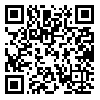Volume 4, Issue 3 (September 2017)
Health Spiritual Med Ethics 2017, 4(3): 14-18 |
Back to browse issues page
Download citation:
BibTeX | RIS | EndNote | Medlars | ProCite | Reference Manager | RefWorks
Send citation to:



BibTeX | RIS | EndNote | Medlars | ProCite | Reference Manager | RefWorks
Send citation to:
Taheri-Kharameh Z, Alinoori A, KHansanami S, Ramezani T, SHarififard F, Aslai P. Relationship between Islamic Lifestyle and Mental Health among the Students of the Qom University of Medical Sciences. Health Spiritual Med Ethics 2017; 4 (3) :14-18
URL: http://jhsme.muq.ac.ir/article-1-113-en.html
URL: http://jhsme.muq.ac.ir/article-1-113-en.html
Zahra Taheri-Kharameh1 
 , Alireza Alinoori *
, Alireza Alinoori * 
 2, SHabanali KHansanami3
2, SHabanali KHansanami3 
 , Tahereh Ramezani4
, Tahereh Ramezani4 
 , Fatemeh SHarififard5
, Fatemeh SHarififard5 
 , Pooya Aslai6
, Pooya Aslai6 


 , Alireza Alinoori *
, Alireza Alinoori * 
 2, SHabanali KHansanami3
2, SHabanali KHansanami3 
 , Tahereh Ramezani4
, Tahereh Ramezani4 
 , Fatemeh SHarififard5
, Fatemeh SHarififard5 
 , Pooya Aslai6
, Pooya Aslai6 

1- School of Paramedical Sciences, Qom University of Medical Sciences, Qom, Iran.
2- Department of Theology, Qom University of Medical Sciences, Qom, Iran ,alireza¬_alinouri@yahoo.com
3- Department of Theology, Qom University of Medical Sciences, Qom, Iran
4- Students Research Center, Department of Public Health, Qom University of Medical Sciences, Qom, Iran. 4 Faculty of Dentistry, Qom University of Medical Sciences, Qom, Iran.
5- School of Paramedical Sciences, Qom University of Medical Sciences, Qom, Iran
6- Faculty of Dentistry, Qom University of Medical Sciences, Qom, Iran.
2- Department of Theology, Qom University of Medical Sciences, Qom, Iran ,
3- Department of Theology, Qom University of Medical Sciences, Qom, Iran
4- Students Research Center, Department of Public Health, Qom University of Medical Sciences, Qom, Iran. 4 Faculty of Dentistry, Qom University of Medical Sciences, Qom, Iran.
5- School of Paramedical Sciences, Qom University of Medical Sciences, Qom, Iran
6- Faculty of Dentistry, Qom University of Medical Sciences, Qom, Iran.
Abstract: (4615 Views)
Background and Objectives: Islamic lifestyle is associated with all dimensions of life and can play an important role in maintaining health. The present study was conducted to investigate correlation between dimensions of Islamic lifestyle and mental health in the students of the Qom University of Medical Sciences.
Methods: The study population of this descriptive-analytical, cross-sectional study conducted in 2016 consisted of the students of the QUMS. Of this population, 150 people were selected by multistage sampling. Data gathering was conducted by the short version of Islamic lifestyle test and 12-item General Health Questionnaire. Data analysis was performed by descriptive statistics, Pearson correlation coefficient, and stepwise multiple regression.
Results: Mean (standard deviation) score for Islamic lifestyle and mental health variables in the students was 417.14±42.21 and 15.4±2.21, respectively. There was a significant correlation between Islamic lifestyle and mental health (r=-0.65, p<0.05). Among the variables included in the stepwise multiple regression, Thinking and Science, Financial, and Social dimensions had significant effect on mental health.
Conclusion: Thinking and Science dimension was the most important Islamic lifestyle aspect followed by Financial and Social dimensions. These components help promote students' mental health.
Methods: The study population of this descriptive-analytical, cross-sectional study conducted in 2016 consisted of the students of the QUMS. Of this population, 150 people were selected by multistage sampling. Data gathering was conducted by the short version of Islamic lifestyle test and 12-item General Health Questionnaire. Data analysis was performed by descriptive statistics, Pearson correlation coefficient, and stepwise multiple regression.
Results: Mean (standard deviation) score for Islamic lifestyle and mental health variables in the students was 417.14±42.21 and 15.4±2.21, respectively. There was a significant correlation between Islamic lifestyle and mental health (r=-0.65, p<0.05). Among the variables included in the stepwise multiple regression, Thinking and Science, Financial, and Social dimensions had significant effect on mental health.
Conclusion: Thinking and Science dimension was the most important Islamic lifestyle aspect followed by Financial and Social dimensions. These components help promote students' mental health.
Type of Study: Original Article |
Subject:
Special
Received: 2016/08/24 | Accepted: 2017/02/11 | Published: 2017/08/7
Received: 2016/08/24 | Accepted: 2017/02/11 | Published: 2017/08/7
Send email to the article author
| Rights and permissions | |
 |
This work is licensed under a Creative Commons Attribution-NonCommercial 4.0 International License. |





